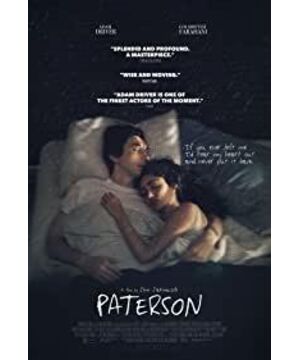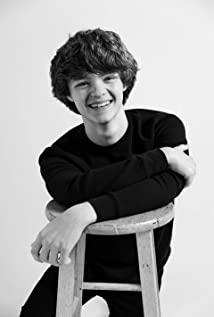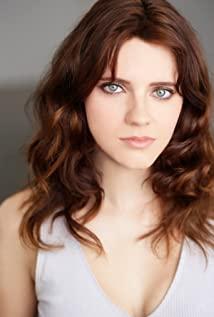The protagonist of "Patterson" is a bus driver named Patterson who lives in the place of Patterson. The director described in an almost outline way that he drives the bus every day, writes poems, and goes home with his girlfriend. Talking, walking the dog, drinking, and sleeping for seven days. It's just that every day is slightly different from the previous day. For ordinary people, what happened in these seven days was mostly trivial things that were not worth mentioning, but for Patterson, who wrote the poem, it was a condensed suffering.
If we can understand Patterson's hopes and anxiety, then the director's deep-buried conflicts in the details can be extracted, and the main line of the film will become clear and interesting.
For example, when did Patterson start to write today's first poem, it was a short time before he was about to drive the bus, but we will find that he has hardly written a poem completely. Because every time, there will be a colleague who is troubled by life. When he was halfway through writing, he came to him with a sad face and talked about his troubles to himself; for another example, when he was drinking in a hotel in a daze, Suddenly, a man who was trapped in love committed suicide. Patterson, who happened to be sitting next to him, rushed forward, knocked him down, and shot down his gun. Similar examples abound in the movies. They just talk about the same thing in a different way: Whenever Patterson is immersed in the spiritual world, someone will break into this world and involve him in the daily, In life that has nothing to do with poetry. Whether it is a lover, hero, listener, passerby, or colleague, Patterson will be more or less distressed. As a poet, the best identity is the bystander. He observes life and describes life. Once he is involved in the life he observes, he becomes at a loss. Standing on the stage, his poetry disappears.
This is why, we can detect a trace of absent-mindedness in Patterson. Even when he is not writing poems, he is not used to or not good at getting into life too much.
While playing tricks on Patterson, the director also began to bring out another trouble for Patterson: I can call it a poem if the pen is on the paper; can I be called a poet if I hold the pen?
The director’s way of expressing this trouble is very cryptic. The method of detection is not to see what Patterson did, but to do nothing: In addition to writing poems, Patterson never admitted that he was one from the front. Famous poet.
When his girlfriend praised his poems, he did not express his happiness or humility too much; when his girlfriend asked him to print the poems, he never felt relieved; when the little girl asked him about poems , He deliberately avoided the fact that he was also writing poems; apart from his girlfriend, no character knew that he was writing poems.
This way of dealing with the need to completely sever the relationship with the poet's identity, on the contrary, shows his sensitivity on this issue. Once he started thinking about this identity, he would start writing poems for other purposes instead of just enjoying the process of writing poems. Patterson deliberately maintained this kind of innocence, perhaps because he was aware of this possibility. This is why I like this character so much. He is a middle-aged man, but he has the enthusiasm of a teenager.
The identity troubles were thoroughly exposed after the pet dog Marvin crushed his collection of poems. If the poetry anthology is the last umbrella for the identity of the poet, what else can prove that he is a poet when the poetry anthology is crushed?
Director Ja Mu Xu introduced an unexpected and gentle answer at the end of the film. When Patterson sat on a park bench and fell into confusion, Nagase, who loves poetry, sat beside Patterson in a ghostly manner, and began to talk to Paterson. Sen discusses poetry. He asked about Patterson's identity. Patterson had to think about this question positively, but he gave a negative answer: I'm just a bus driver.
The subsequent dialogue made Nagase's position in the film very important, because there has never been a mature character willing to enter Patterson's world instead of pulling Patterson out of the world of poetry. The little girl who discussed poetry with Patterson before, could not appreciate the troubles of Patterson’s identity as a poet because of her age. And Nagase Masatoshi not only took the initiative to enter the world of Patterson's poetry, but also calmly talked about poetry, poets and poetry, as if talking about these would not bother him, nor would it affect the power of poetry.
Nagase’s attitude is that being a Patterson bus driver is a very poetic thing in itself. Not only that, but also to talk about William Carlos Williams and Frank O’Hara. Why is there a reason? Say you are just a bus driver?
He asked a few questions, talked about some poets, and found Patterson interesting, so he left a blank book for him. The problem that Patterson had been deliberately avoiding was so easily ripped out, and the answer was forced into it.
Even if you devote your spirit to poetry, you can still treat it lightly. A bus driver sitting on a bench willing to discuss poetry can almost be called a poet.
A week in which nothing happened has already contained the undercurrents of Patterson's entire poetry career.
I think this allows Jamuxu to show the ability to create gentleness. He can catch any fluctuations in the realization of dreams, and he can also smooth them with a sincere answer.
Even if it is impossible to describe exactly what the story is about in this movie, many people can recall their heart beating when they were young without asking for anything in a moment.
I love Adam Driver.
View more about Paterson reviews











